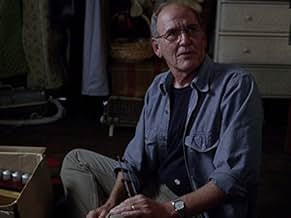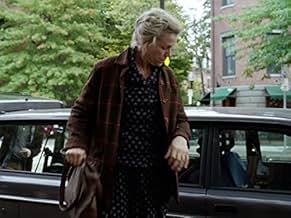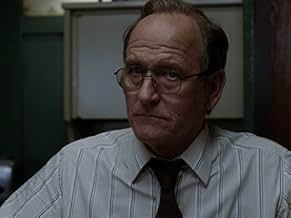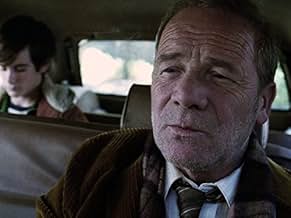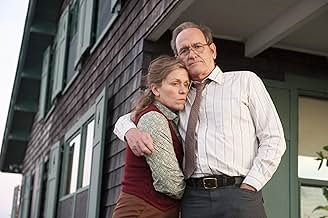Una profesora de matemáticas de secundaria, Olive, y su matrimonio con Henry, que lleva 25 años.Una profesora de matemáticas de secundaria, Olive, y su matrimonio con Henry, que lleva 25 años.Una profesora de matemáticas de secundaria, Olive, y su matrimonio con Henry, que lleva 25 años.
- Ganó 8 premios Primetime Emmy
- 31 premios ganados y 35 nominaciones en total
Explorar episodios
Opiniones destacadas
You could watch this series along with "Terms Of Endearment" and get a really good dose of dysfunctional family dynamics. And learn something about growing old. And that we're not all that different. You can learn a lot from tough ol' broads. Or you can resent them. The one thing we know is, they will outlive their supposed time on Earth.
The titular character is played pitch perfect by Frances McDormand. Already an old soul when we first seen her in the Coen Brothers movies, she is the epitome of hard as rock stubborn New Englander. Educated by life experiences, her harsh reality is that tragedy has shaped her into a flawed diamond. Indestructible in her set ways, she lives with regret and unknowing to her (but every clear to us) projects her resentment towards the people who actually love her. Unfortunately, in her path is her kind hearted husband Henry Kitteridge (Richard Jenkins), in a stunningly sympathetic and patient man who reaches out to help lost young girls, but does so with the distancing manner of a father. There appears a sexual predator is a foot, but that isn't Henry's nature. He is the town pharmacist who we can see may have had bigger dreams in life, but is content to fulfill his duties to the community. He's seen first as a step rug, then a sounding board, but finally a man. All the parts of which make up a marriage in a small town community dynamic. We could've/would've/should've is pushed so far into the backburner as to cause conflict. And the developments of our youth are shaped by the overwhelming need of parents to control. You will reap what you sow. There wasn't a false moment in this mini-series. It's often painful, a lot of humor, bittersweet moments, tragedy and a lot of moments as I watched the outcome of their history turn to foreshadowed misery that I mutter "Damn that sucks that happened." Not out of pity, but that it is a universal storyline that we all get sickened by.
There are a lot of moments of grimness. In particular, the ease of resolution and mental issues. Even as late as my own generation, mental illness was seen as an embarrassment. People were considered spazzes if they were hyperactive. Or if their parent had drug addiction or drinking problems, they'd be ignored. The kids tend to shrug that off. That's the issue though. Cause life will give us obstacles in the form of relatives or spawn. We are owed nothing, but seem to carry on this notion we're suppose to be living someone else's life. We suppress our needs, if we genuinely care about people. Lost are the times when we hold back, now is the time when people often give up too soon. Is Olive's decision to power through life unhappy the right course for you? Probably not. But it's something to be admired. This mini-series is amazing.
The titular character is played pitch perfect by Frances McDormand. Already an old soul when we first seen her in the Coen Brothers movies, she is the epitome of hard as rock stubborn New Englander. Educated by life experiences, her harsh reality is that tragedy has shaped her into a flawed diamond. Indestructible in her set ways, she lives with regret and unknowing to her (but every clear to us) projects her resentment towards the people who actually love her. Unfortunately, in her path is her kind hearted husband Henry Kitteridge (Richard Jenkins), in a stunningly sympathetic and patient man who reaches out to help lost young girls, but does so with the distancing manner of a father. There appears a sexual predator is a foot, but that isn't Henry's nature. He is the town pharmacist who we can see may have had bigger dreams in life, but is content to fulfill his duties to the community. He's seen first as a step rug, then a sounding board, but finally a man. All the parts of which make up a marriage in a small town community dynamic. We could've/would've/should've is pushed so far into the backburner as to cause conflict. And the developments of our youth are shaped by the overwhelming need of parents to control. You will reap what you sow. There wasn't a false moment in this mini-series. It's often painful, a lot of humor, bittersweet moments, tragedy and a lot of moments as I watched the outcome of their history turn to foreshadowed misery that I mutter "Damn that sucks that happened." Not out of pity, but that it is a universal storyline that we all get sickened by.
There are a lot of moments of grimness. In particular, the ease of resolution and mental issues. Even as late as my own generation, mental illness was seen as an embarrassment. People were considered spazzes if they were hyperactive. Or if their parent had drug addiction or drinking problems, they'd be ignored. The kids tend to shrug that off. That's the issue though. Cause life will give us obstacles in the form of relatives or spawn. We are owed nothing, but seem to carry on this notion we're suppose to be living someone else's life. We suppress our needs, if we genuinely care about people. Lost are the times when we hold back, now is the time when people often give up too soon. Is Olive's decision to power through life unhappy the right course for you? Probably not. But it's something to be admired. This mini-series is amazing.
Never comfortable to watch, this gem as a story and as a vehicle for incredible performances is not to be missed. The story can be summarized in a very brief exchange between Olive and her husband Henry. The latter, a sucker for greeting cards it seems, buys Olive a simple little card that says "For My Wife". Inside the message is "Simply to say I love you" and his initial as a signature. It's Fathers Day, but he has purchased his wife some flowers and this card. He hands her the card and says "I love you." She reads it and replies "Yes, you do", handing him back both the card and the flowers with dirty garden-stained hands.
This is a dark, dismal, dreary narrative with extreme moments of touching emotion and fleeting happiness. Life for all of the characters in this story is a constant succession of negativity and hopelessness. And Olive is The Queen of the Depressed. Townspeople, too, are for the most part, cantankerous: Henry's initial store clerk; Olive's friend, Bonnie; the high school secretary; a customer standing in line at a pharmacy. Someone peed in all of their cereal. And it is the pathetic,somebody's-gotta-play-the-clown Henry who recommends to a Valium-addicted schizophrenic customer that she buy brighter light bulbs to fend off depression.
The performances are so intricate and under-played. How can playing a depressed person be intricate? Watch Frances McDormand's depiction of Olive. It's a must for any actor, and sheer joy for an audience member. And the supporting cast's performances are no less exemplary. Richard Jenkins as Henry provides phenomenal contrast. He really is the "yang" to Olive's "yin". And it is precisely this complementary distribution in their philosophies of life (as characters) and performances (as actors) that makes this truly one of the most amazing films. However, it is frequently extremely uncomfortable to watch because of the level of negativity we are compelled to watch. There are two scenes (one on a seaside cliff and the other at a piano bar) that are positively creepy but so perfect for the character who is envisioning them, another inhabitant of this Village of the Damned. Are there any happy people in this town? No. Henry and maybe one or two other characters try to cheer things up, but one feels as if they are doomed in their attempts to shed light on the rest.
This drama is sadly sympathetic, and no less pathetic a depiction of a jaundiced relationship than George and Martha in "Who's Afraid of Virginia Woolf?" The latter is certainly more bombastic than this film, which makes "Olive Kitteridge" even sadder as it is reflected in these lives of quiet desperation.
These are award-winning performances, script, and film. Don't miss it.
This is a dark, dismal, dreary narrative with extreme moments of touching emotion and fleeting happiness. Life for all of the characters in this story is a constant succession of negativity and hopelessness. And Olive is The Queen of the Depressed. Townspeople, too, are for the most part, cantankerous: Henry's initial store clerk; Olive's friend, Bonnie; the high school secretary; a customer standing in line at a pharmacy. Someone peed in all of their cereal. And it is the pathetic,somebody's-gotta-play-the-clown Henry who recommends to a Valium-addicted schizophrenic customer that she buy brighter light bulbs to fend off depression.
The performances are so intricate and under-played. How can playing a depressed person be intricate? Watch Frances McDormand's depiction of Olive. It's a must for any actor, and sheer joy for an audience member. And the supporting cast's performances are no less exemplary. Richard Jenkins as Henry provides phenomenal contrast. He really is the "yang" to Olive's "yin". And it is precisely this complementary distribution in their philosophies of life (as characters) and performances (as actors) that makes this truly one of the most amazing films. However, it is frequently extremely uncomfortable to watch because of the level of negativity we are compelled to watch. There are two scenes (one on a seaside cliff and the other at a piano bar) that are positively creepy but so perfect for the character who is envisioning them, another inhabitant of this Village of the Damned. Are there any happy people in this town? No. Henry and maybe one or two other characters try to cheer things up, but one feels as if they are doomed in their attempts to shed light on the rest.
This drama is sadly sympathetic, and no less pathetic a depiction of a jaundiced relationship than George and Martha in "Who's Afraid of Virginia Woolf?" The latter is certainly more bombastic than this film, which makes "Olive Kitteridge" even sadder as it is reflected in these lives of quiet desperation.
These are award-winning performances, script, and film. Don't miss it.
If you liked McDormand's performance in Fargo, Olive Kitteridge will surely not disappoint. I look forward to reading the book now and only wish that perhaps I'd read it before watching the mini-series. I loved much about this mini-series but most especially the straightforward way that depression is handled. Olive is a complex character (not all bad or all good) and while her behavior might be tough to swallow, McDormand treats us to a realistic portrayal of the disease of depression and how is affects every facet of her life and those around her. Some well played foreshadowing moments and times of contradictory behavior make the plot and characters more interesting. I gave it a 10/10 because this is the kind of movie I enjoy, but know that it might not appeal to everyone, especially if you just want to watch a feel good or relaxing movie. This one will challenge you to think a bit more and examine your own dysfunctional behavior (and/or that of your family) which may not be too comfortable. Also enjoyed the other characters, especially Henry and Christopher.
I've just read some of the negative reviews about Olive Ketteridge. I thought it was obvious what we were getting into in the first 30 minutes of this brilliant mini series. Yes it's a bit downbeat. But Olive Ketteridge is about real people and real situations, and let's face it it reflects certain areas of real life. I think we've all known characters like the ones portrayed in Olive Ketteridge. All the performances are spot on. Plus there are many areas of Olive Ketteridge that made this viewer smile. So I don't see the negativity. Maybe the negative reviews come from people who wanted to see a Deloris Claybourne or a True Detctive. Olive Ketteridge is about love, loss and what ifs, and that's about it.. But it's told so well that one almost forgets that the story's so simple.
Family dysfunction reigns supreme in this oft-uncomfortable psycho-drama set in bucolic Maine over the course of 25 recent years. Nice, gentle, middle-aged pharmacist and sensitive, caring man married to a hard=edged, stern and very often mean schoolteacher who knows she is sick and "a beast" but cannot change her hurtful and often hateful ways, even to her own son who is obviously more like his dad, a nice boy scarred forever by his mother's mean words and insensitive nature. Depression "runs" in her family, she said, and it is easy to spot throughout in her as she suffers progressively from it as the story develops.
Frances McDormand shines bright in her demanding role as the hard-as-nails wife and mother who finds it so hard to show love or even "like" to her family, and she is always more than ready with a scathing snipe no matter the occasion or person, even at their son's wedding. Richard Jenkins is also very impressive as her good guy husband who is always nice, friendly and comforting to those around him who need it most. His Yin to her Yang, totally.
Coastal Massachusetts scenery subbing for Maine is stunning and beautifully shot. The script, though excellent and always engrossing, is often discomforting to watch, as there is little levity in it and things often get very serious and mean-spirited. No everyman crowd-pleaser this one, but it is very intelligently done and packs a hard and lasting, dysfunctional family/mental health punch for viewers expecting more from premium channel TV than silly laughs and chuckles from junk programming. Not many laughs here, just quality storytelling you will not easily forget.
Frances McDormand shines bright in her demanding role as the hard-as-nails wife and mother who finds it so hard to show love or even "like" to her family, and she is always more than ready with a scathing snipe no matter the occasion or person, even at their son's wedding. Richard Jenkins is also very impressive as her good guy husband who is always nice, friendly and comforting to those around him who need it most. His Yin to her Yang, totally.
Coastal Massachusetts scenery subbing for Maine is stunning and beautifully shot. The script, though excellent and always engrossing, is often discomforting to watch, as there is little levity in it and things often get very serious and mean-spirited. No everyman crowd-pleaser this one, but it is very intelligently done and packs a hard and lasting, dysfunctional family/mental health punch for viewers expecting more from premium channel TV than silly laughs and chuckles from junk programming. Not many laughs here, just quality storytelling you will not easily forget.
¿Sabías que…?
- TriviaFrances McDormand bought the rights of the novel years before she could make it into anything. Her involvement extended to the point of hiring writer Jane Anderson, director Lisa Cholodenko and co-star Richard Jenkins.
- ConexionesFeatured in 72nd Golden Globe Awards (2015)
Selecciones populares
Inicia sesión para calificar y agrega a la lista de videos para obtener recomendaciones personalizadas
- How many seasons does Olive Kitteridge have?Con tecnología de Alexa
Detalles
- Fecha de lanzamiento
- País de origen
- Sitio oficial
- Idioma
- También se conoce como
- Олівія Кіттерідж
- Locaciones de filmación
- Productoras
- Ver más créditos de la compañía en IMDbPro
- Tiempo de ejecución1 hora
- Color
- Mezcla de sonido
- Relación de aspecto
- 1.78 : 1
Contribuir a esta página
Sugiere una edición o agrega el contenido que falta

Principales brechas de datos
What is the Canadian French language plot outline for Olive Kitteridge (2014)?
Responda

